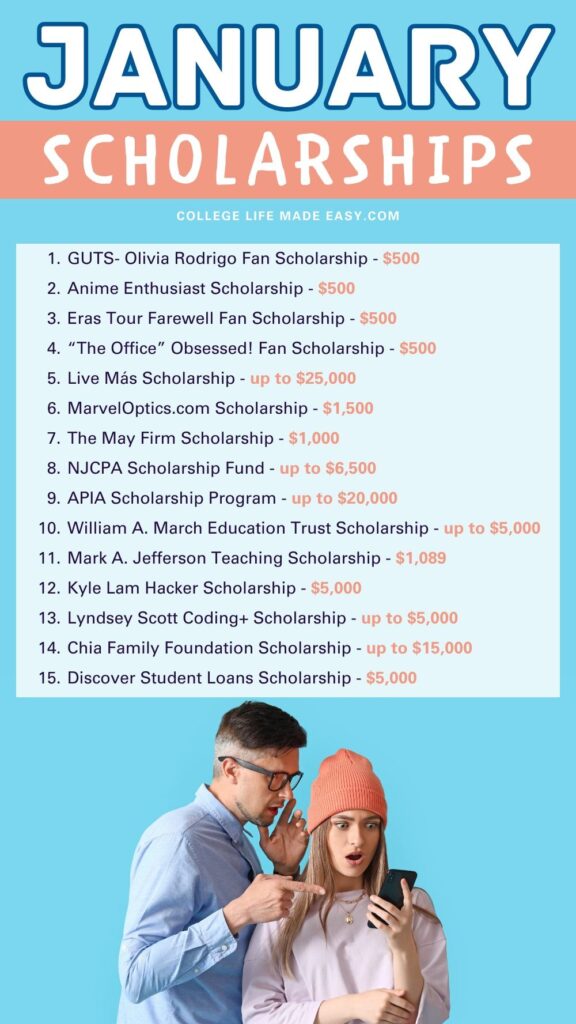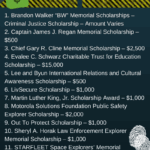Unlocking Your Teaching Potential: My Personal Journey to Finding Scholarships for Teachers
Remember that feeling? The one where your heart is bursting with ideas for your students, you dream of new teaching methods, or you just know there’s more you could learn to be an even better educator? I know it well. For years, I felt that pull. I wanted to pursue a master’s degree, attend specialized training, or even just get a new certification. But then, the real-world voice would whisper in my ear: "How will you afford it?"
That voice, my friends, was a constant companion. Teaching isn’t just a job; it’s a calling. It demands so much of us, our time, our energy, our passion. But sometimes, it feels like professional growth, especially when it involves tuition fees, is a luxury we can’t afford. I loved my students, I loved my classroom, but I felt stuck. I was good, but I wanted to be great. And "great" often comes with a price tag.
This isn’t just my story; it’s the story of countless dedicated teachers around the world. We pour our hearts into our work, shaping young minds, yet often put our own learning on the back burner because of financial worries. But what if I told you there’s another way? What if I told you that my journey, once bogged down by financial anxieties, took a surprising turn?
I want to share with you how I discovered the world of scholarships for teachers. It’s a path that changed my career, boosted my confidence, and, most importantly, allowed me to bring so much more back to my classroom without breaking the bank. If you’re a teacher, an aspiring teacher, or even just someone who loves an educator, pull up a chair. This story is for you.
The Crossroads: Wanting More, But Hesitating
For years, I’d scroll through university websites, looking at their education programs. Each time, I’d get excited, imagine myself in those classes, learning new strategies. And then I’d see the tuition costs. My heart would sink a little. Between living expenses, student loan payments from my undergraduate degree, and a teacher’s salary, adding another big financial commitment felt impossible.
I spoke to colleagues who had pursued advanced degrees. Some had taken out huge loans, which stressed them out for years. Others had waited until retirement to finally pursue their learning goals. I didn’t want to wait, and I certainly didn’t want to drown in more debt. There had to be another way, right?
The "Aha!" Moment: A Casual Conversation, A World Unlocked
My "aha!" moment didn’t come from a grand revelation or an extensive research project. It came from a simple chat in the staff room. I was complaining (again!) about wanting to get my literacy specialist certification but being unable to afford it. A veteran teacher, Mrs. Davis, bless her heart, looked at me over her coffee cup.
"Why don’t you apply for a scholarship, dear?" she asked, as if it were the most obvious thing in the world.
I blinked. "A scholarship? Aren’t those just for high schoolers going to college?"
She chuckled softly. "Oh, honey, no. There are tons of scholarships out there specifically for teachers. For current teachers, for aspiring teachers, for teachers wanting to specialize. You just have to know where to look."
That conversation was a light switch. It wasn’t just about finding money; it was about realizing that there were organizations, foundations, and even individuals who believed in teachers enough to invest in their growth. It felt like someone was finally saying, "Yes, your professional development matters, and we want to help."
My Scholarship Hunt: Where I Started Looking (And You Can Too!)
Mrs. Davis’s words were the spark, but the actual hunt began with me, my laptop, and a lot of late nights. Here’s a breakdown of where I focused my search, which I now recommend to every teacher I meet:
-
Online Search Engines (Be Specific!):
Don’t just type "scholarships." Get detailed. I started with "scholarships for current teachers," then "scholarships for literacy specialists," "education grants for teachers," and "funding for professional development for educators." The more specific you are, the better results you’ll get. I found websites that compile lists of scholarships, like Fastweb, Scholarship.com, and specific education scholarship databases. -
Professional Organizations: These are Goldmines!
This was a huge discovery for me. Think about your subject area or the type of teaching you do.- Are you a science teacher? Look at the National Science Teachers Association (NSTA).
- A math teacher? Check out the National Council of Teachers of Mathematics (NCTM).
- English/Language Arts? The National Council of Teachers of English (NCTE) or the International Literacy Association (ILA).
- Special Education? Council for Exceptional Children (CEC).
- General education? Your state’s education association.
Many of these organizations offer their own scholarships, grants for projects, or lists of external funding opportunities.
-
Your Own School District & University Education Departments:
Don’t underestimate your immediate community!- School District: Some districts offer tuition reimbursement programs or professional development funds. Ask your HR department or principal.
- Universities: If you’re thinking of a specific program, check the university’s financial aid page and the specific department’s page. Often, departments have small, specialized scholarships that aren’t widely advertised but are perfect for their students.
-
Local Community Foundations & Organizations:
Look up "community foundations" in your city or county. Many of these foundations have funds dedicated to local educators or those pursuing specific fields. They might be smaller awards, but every bit helps, and they often have less competition. -
Government Programs:
Sometimes, state or federal governments have programs designed to address teacher shortages in specific areas (like STEM, special education, or teaching in rural schools). These often come with service commitments but can be very generous.
Crafting My Application: Telling My Story, Not Just Listing My Grades
Finding the scholarships was one thing; actually applying was another. It felt daunting at first. But I learned a few key lessons that made all the difference:
-
Read the Instructions Carefully (No, Really!): This sounds obvious, but so many people get disqualified for not following simple directions. Do they want a 500-word essay or a 1,000-word essay? Do they need two letters of recommendation or three? Pay attention!
-
Tell Your Story: This was the biggest game-changer. Scholarship committees aren’t just looking for perfect grades; they’re looking for passion, dedication, and potential impact. In my essays, I didn’t just list my accomplishments. I talked about why I wanted to be a literacy specialist. I shared anecdotes about students who struggled with reading and how I felt driven to help them more effectively. I spoke about my vision for my classroom and my school. Be authentic, be personal. Let your passion shine through.
-
Get Strong Recommendation Letters: Choose people who know you well and can speak to your strengths as an educator. Your principal, a veteran colleague, a university professor. Give them plenty of notice, provide them with your resume, and explain what the scholarship is for and why you’re applying. Make it easy for them to write a glowing letter.
-
Proofread, Proofread, Proofread: A sloppy application with typos or grammatical errors sends a message that you don’t care enough. I’d write my essays, step away, then come back to them with fresh eyes. I also asked a trusted friend (another teacher, of course!) to read them over. A second pair of eyes is invaluable.
-
Don’t Give Up After One "No": I got rejection letters. More than one. It stung, but I learned to see it as part of the process. Every "no" brought me closer to a "yes." Each application I submitted refined my story and made the next one easier.
Beyond the Money: The Unexpected Benefits
Eventually, after a few tries, I got a "YES!" It wasn’t a full scholarship, but it was a substantial amount that made my master’s degree truly affordable. I can’t even describe the relief, the joy, the surge of motivation.
But here’s the thing: the money, while essential, wasn’t the only benefit.
- Confidence Boost: Knowing that someone believed in me enough to invest in my education was incredibly empowering. It validated my passion and my dedication.
- Networking: The application process, and then the actual program, connected me with other passionate educators, mentors, and professionals I wouldn’t have met otherwise.
- Increased Impact: My new knowledge and skills directly translated into better teaching practices. I saw the difference in my students’ engagement and learning, and that’s the ultimate reward.
- A Sense of Agency: I wasn’t just waiting for things to happen; I was actively shaping my own professional future.
Dispelling the Myths: "It’s Too Hard," "It’s Not For Me"
I hear these doubts all the time from other teachers, and I once shared them myself. Let’s tackle them:
- "Scholarships are only for straight-A students." Not true! While grades can be a factor, many scholarships prioritize passion, leadership, community involvement, specific teaching areas, or unique life experiences. Your story often matters more than your GPA.
- "It’s too competitive." Yes, some are. But many smaller, local, or highly specialized scholarships have fewer applicants. And even with competitive ones, if you don’t apply, you definitely won’t get it. You miss 100% of the shots you don’t take, right?
- "I don’t have time to apply." This is a valid concern for busy teachers. But think of it this way: spending a few hours on applications now could save you thousands of dollars and years of debt later. Break it down into small steps. Write one essay draft one week, gather recommendations the next.
- "I’m too old/too young/too experienced/not experienced enough." There are scholarships for every stage of a teacher’s career, from aspiring educators to seasoned veterans looking for new challenges. Don’t let your current stage stop you.
Your Turn: Take That First Step
My journey showed me that scholarships for teachers aren’t some mythical pot of gold at the end of an impossible rainbow. They are real, they are out there, and they are waiting for dedicated educators like you.
If you’re feeling that familiar tug, that desire to learn more, to do more, to be more for your students and yourself, please don’t let financial fears hold you back. Take that first step, just like I did.
Start with a simple online search. Reach out to your professional organizations. Talk to your colleagues. Tell your story, believe in your impact, and apply. The journey might have its bumps, but the rewards – both financial and professional – are absolutely worth every single step. Your teaching potential is limitless, and there are people out there who want to help you unlock it. Go for it!
Frequently Asked Questions About Scholarships for Teachers
Q1: Are scholarships only for aspiring teachers, or can current teachers apply too?
A: Absolutely! Many scholarships are specifically designed for current, practicing teachers who want to pursue advanced degrees, certifications, professional development, or even innovative classroom projects. Don’t let anyone tell you otherwise!
Q2: I don’t have perfect grades. Do I still have a chance?
A: Yes, definitely! While some scholarships consider academic merit, many others focus on your passion for teaching, your unique experiences, leadership potential, community involvement, and the impact you aim to make. Your personal story and dedication often weigh more heavily than a perfect GPA.
Q3: Where is the best place to start looking for teacher scholarships?
A: Begin with specific online searches (e.g., "scholarships for [your subject] teachers," "education grants for K-12 educators"). Then, explore professional organizations related to your teaching field (e.g., NSTA, NCTE, ILA), your local university’s education department, and community foundations in your area.
Q4: How important are recommendation letters?
A: Very important! A strong recommendation letter from someone who knows your teaching abilities and dedication (like a principal, mentor, or professor) can significantly boost your application. Choose recommenders wisely and give them ample time and information.
Q5: What should I focus on in my scholarship essay?
A: Focus on telling your story. Explain why you are passionate about teaching, why you want to pursue this specific learning opportunity, and how it will ultimately benefit your students and community. Be authentic, specific, and let your personality shine through.
Q6: Is it really worth the time and effort to apply for scholarships?
A: From my personal experience, a resounding YES! The time invested in applications can save you thousands of dollars in tuition and debt, open doors to new professional opportunities, and provide a huge boost to your confidence and career trajectory. Every application is a step forward.



